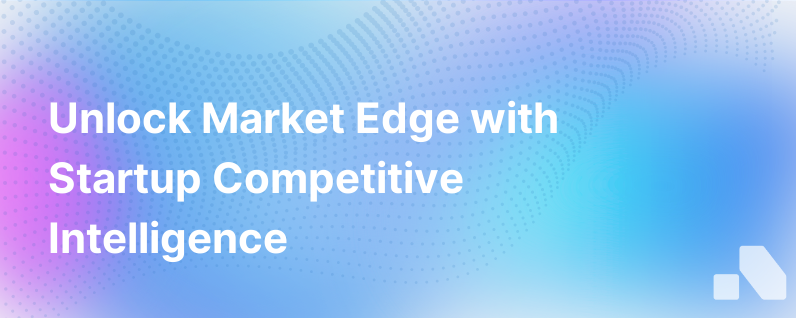Competitive Intelligence For Startups
Published on December 15, 2023 by Sawyer Middeleer
In the rapidly-changing, highly competitive business landscape, staying ahead of the game is the key to survival. Startups, in particular, must leverage every resource and tool available to survive, pivot, and grow. One such strategic tool is competitive intelligence.
Competitive intelligence is the act of collecting and analyzing information about competitors and the marketplace to make more informed strategic decisions.
This guide will take you on a detailed tour of the realms of competitive intelligence for startups - its importance, how to develop it, use it, and we'll even discuss a few tools that can assist in the process.
Why Competitive Intelligence matters:
For startups, the stakes are high, resources are scarce, and every decision counts. Most new ventures operate in either crowded markets or uncharted territories, making it vital to understand the competitive landscape. Here's why:
- Identifying Opportunities and Threats: Being aware of the moves your competitors are making enables rapid response to threats and allows you to seize opportunities before many others even spot them.
- Battle-Ready Pitches: The knowledge of your competitive landscape allows you to present your startup in a way that emphasizes the unique value you bring to the table.
- Decision Making: Market trends, technologic shifts, competitor actions can all greatly influence your product and strategic decisions.
- Risk Reduction: Knowing your competition reduces the surprise element and equips your startup to proactively handle risks.
Conducting Competitive Intelligence:
For a startup, collecting competitive intelligence involves gathering data on various fronts. Be mindful, this isn't about corporate spying, it's about staying informed in a perfectly ethical way.
-
Identify Key Competitors: Understand who your actual competitors are. They could be direct competitors offering similar products or indirect ones catering to the same need with different solutions.
-
Competitor Analysis: Assess their product features, pricing strategies, market presence, strengths, and weaknesses. Look at their customer reviews and testimonials to understand what's working and what’s not for them.
-
Product and Service Developments: Keep an eye out for any new product launches, enhancements, or changes in their service offerings. Lookout for patent filing as it can be a precursor to future advancements.
-
Marketing Strategies: Look at how they're engaging with their audience. What channels are they using? What sort of messaging resonates with their customers?
-
Financials and Ownership: Gain insights into their revenue, funding, as well as mergers and acquisitions.
-
Leadership and Personnel: Watch out for any changes in key team members. New leadership often signifies strategic shifts.
-
Strategic Moves: Keep an eye on their partnerships, alliances, and business relationships.
Leveraging Competitive Intelligence:
Collecting competitive intelligence is just one part of the equation. Drawing actionable insights from it and using it to your startup's advantage is the more significant step.
- Shape your positioning: Highlight your unique selling proposition and differentiate yourself from the crowd.
- Outsmart the competition: Spot gaps in your competitors’ strategies and exploit them to outperform them.
- Influence product enhancements: Identify features that competitors’ products are lacking and implement those in your product line.
- Beat Price Wars: Identify gaps in your competitors' pricing strategy and provide your customers with a better deal.
- Foresee Market Changes: Stay informed about token shifts in your industry and adjust accordingly.
Competitive Intelligence Tools:
While manually monitoring all these aspects may sound overwhelming, thankfully, there are several tools like SEMrush, Similarweb, Owler, and Crayon that can save you time and provide valuable insights.
For instance, Aomni, a cutting-edge AI platform, offers real-time competitive insights pertinent to B2B sales. It delivers invaluable research, personalized sales content, while requiring zero effort from your side.
Conclusion
Competitive Intelligence is not a one-time activity but a continuous process. By systematically leveraging it, you can positively impact your competitive positioning, go-to-market strategies, and overall corporate strategy.
So, gain the edge in this fiercely competitive world by investing in competitive intelligence. Use it smartly to win more clients, retain them longer, and grow faster. And remember, tools like Aomni can make your journey both efficient and effective.